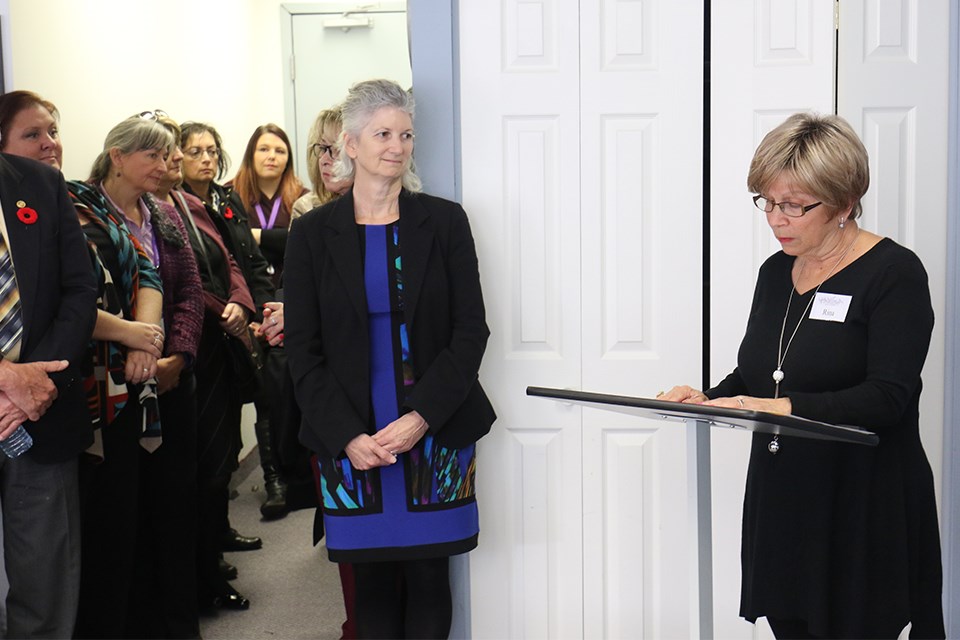NEWS RELEASE
NORTH EAST LHIN
*************************
Rina Clark knows how life-altering a dementia diagnosis can be. The Sault Ste. Marie woman has been a caregiver and an advocate for her husband, David, since he was diagnosed with Alzheimer’s 13 years ago. Rina has spoken publicly about her experiences and today, as a member of the North East LHIN’s Patient and Family Advisory Committee, she shared her story at a North East LHIN announcement of more than $195,000 in dementia and mental health for people living across Algoma.
“I know first-hand that it can be difficult to navigate the system,” said Clark. “It’s important to have the right supports in place to help patients and their caregivers. It’s also important for people working in the system to listen to the voices of the people on the ground—patients, caregivers, and front-line workers.”
Interim North East LHIN CEO Kate Fyfe noted, “The investments announced today are truly people–focussed and will better support people living with dementia or mental health issues in Algoma. “We will continue to include the voices of Northerners like Rina in our work to improve access to care across northeastern Ontario.”
Investments include:
First Link Expansion ($92,140) - First Link is an Alzheimer’s Society program that links people with dementia and their care partners to coordinated learning, services, and community support. First Link helps dementia patients and family members make informed choices so they are better supported.
Behaviour Supports ($13,500) - An Alzheimer’s Society’s Behaviour Supports Facilitator assists people living with dementia by helping to manage their responsive behaviours through activities such as behavior mapping and caregiver education. It can also decrease incidences of responsive behavior- such as frustration and wandering.
Exercise therapy ($2,600) - Minds in Motion is a group recreational therapy program that combines low-impact exercises with activities that focus on socializing and building personal skills. It is targeted to participants who have early-to-mid stage dementia. This investment allows the program to expand and become available on two half-days per week.
Mental Health Counselling in North Algoma ($90,000) – Hearst Kapuskasing Smooth Rock Falls Counselling in partnership with Hornepayne Community Hospital will offer local mental health counselling services to over 50 clients per year in the community of Hornepayne. These services will be provided face to face, by telephone, and by Ontario Telemedicine Network.
Facts:
There are about 2,800 people diagnosed with Alzheimers in the Algoma District.
Minds and Motion is a recreational therapy program offered by the Alzheimer’s Society for early-to-mid stage dementia patients and their caregivers. The program focuses on low-impact exercises in a fun and sociable environment.
Behaviour Supports Ontario is a province-wide initiative that aims to improve quality of life for persons with dementia and their care partners by helping to manage responsive behaviours. The Alzheimer’s Society’s Behaviour Support Facilitator can assist with responsive behaviours through activities such as behaviour mapping and caregiver education.
The NE LHIN provides about $257 million in health care funding for the 102,000 people living in the Algoma sub-region every year.
The NE LHIN Patient and Family Advisory Committee is comprised of 18 representatives from across the NE LHIN’s geographical area. The PFAC works in partnership with the LHIN to ensure local priorities and health system priorities are addressed collaboratively with patients and their families. They held their first meeting on Oct. 30, 2017.
Ontario is investing more than $100 million over three years towards a dementia strategy that will improve access to high-quality care for people living with dementia and their care partners.
*************************
